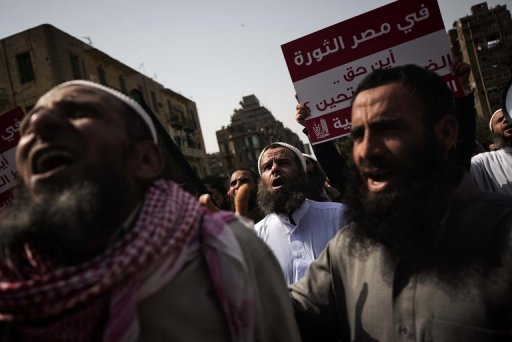NOUAKCHOTT: The death sentences handed down to three Al-Qaeda members sets a new precedent in Mauritania but may not deter Islamic militants whose presence is growing in the country, commentators say.
The Nouakchott criminal court on Tuesday sentenced Mohamed Ould Chabarnou, 29, Maarouf Ould Haiba, 28, and Sidi Ould Sidna, 22 to death for the murder of four French tourists in 2007.
"The court sought a verdict equal to the damage suffered by Mauritania – to its image in the world, its economy – and by France as an important partner," terrorism specialist Isselmou Ould Salihi of weekly newspaper Tahalil told AFP.
"But ultimately, the death penalty is no solution with the Salafists (radical Muslims) who adopt death anyway for their suicide bombers. Its application would be useless," he said.
The chilling shooting, which was survived by a fifth victim, François Tollet in his seventies, marked a turning point for the largely-desert nation, known as being visitor-friendly and peaceful despite a string of coup d’etats.
Tourism arrivals plummeted 60 percent in one year in the country, and shortly after the attacks the popular Paris-Dakar rally was cancelled and has not been held in Africa since – where it provided an economic boost to several countries.
Since then Al-Qaeda in the Islamic Maghreb (AQIM) — a group which originated in resistance to Algeria’s secular government — has spread its influence in the region, claiming responsibility for several deadly attacks.
These include the murder of an American, the kidnapping of Spaniards, Italians and a Frenchman and in August 2009 for the first time, a young Mauritanian blew himself up outside the French Embassy in Nouakchott.
In an interview with AFP, the editor-in-chief of Nouakchott Info, Mohamed Mahmoud Ebilamaali examined the choices before President Mohamed Ould Abdel Aziz after the end of the trial.
"Political power can now have its say. He may commute sentences, grant forgiveness. This is another process which could give meaning to the spiritual dialogue initiated at the beginning of the year with Salafist prisoners" in Nouakchott.
In February, Mauritanian theologian Mohamed El-Hassen Ould Dedaw said the accused had "repented" their role in the French killings during a government-mandated dialogue between religious leaders and prisoners.
However during their trial the three youths presented themselves as "Al-Qaeda soldiers" engaged in "Jihad", acknowledging that they had been "trained in camps" of Al-Qaeda.
They also reacted to their sentence with threats against France and President Nicolas Sarkozy.
"Our death sentence means the death sentence of all the French in Mauritania and even beyond, to Afghanistan," the youngest of the condemned, 22-year-old Sidna shouted in Arabic.
"We can regard this verdict, which is without precedent, as dissuasive and constituting a new step in the war against Al-Qaeda," said the director of the Tribune newspaper Mohamed Vall Ould Oumère.
But "the reaction of the three condemned could equally be read as a denial of their repentance."
"In summary, the trial is far from solving the problem," he added.
In France, the sole survivor of the December 2007 attack, Francois Tollet, remains fiercely opposed to the death penalty "no matter what the circumstances" despite losing two sons, a brother and a friend in the shooting.
"It won’t give me back my sons," he told the newspaper Le Dauphine.
"I find it lacks dignity … It is revenge, it is everything except justice."
